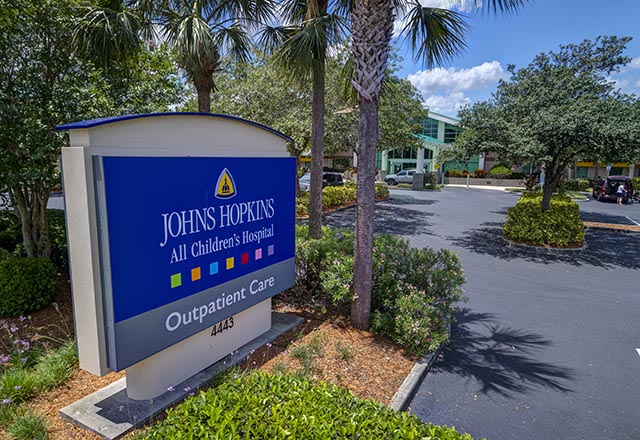Scoliosis and Spine Surgery
Led by fellowship-trained spine specialists, the orthopaedic surgeons at Johns Hopkins All Children’s Hospital use advanced technology and minimally invasive surgery techniques to treat scoliosis and kyphosis.
Scoliosis affects about 7 million people in the United States. Of every 1,000 children, three to five will develop spinal curves significant enough to need treatment. The spine surgery team at Johns Hopkins All Children’s Hospital has decades of experience in performing scoliosis surgery.
Spine surgery at Johns Hopkins All Children’s is performed by the experts from Children’s Orthopaedic and Scoliosis Surgery Associates, L.L.P. (COSSA). The COSSA spine surgery team is led by board-certified, fellowship-trained physicians Ryan Fitzgerald, M.D., and Gregory V. Hahn, M.D.
With more than 50 years of combined experience, the Children's Orthopaedic and Scoliosis Surgery Associates, L.L.P., have performed more than 1,375 scoliosis surgical procedures to date, treating more than 100 children and teens annually. Providing the latest in treatment options for patients with spinal conditions like scoliosis and kyphosis, they carefully evaluate each patient to determine treatment for both surgical and non-surgical cases.
What is Scoliosis and Kyphosis?
 Kyphosis
Kyphosis Scoliosis
ScoliosisEarly onset scoliosis is scoliosis that appears in children under the age of 10. It often occurs in children with other health issues, like chest wall deformities, neuromuscular diseases or spinal tumors. Children with early onset scoliosis may also experience heart and lung problems if left untreated, so early diagnosis and treatment is important. Treatment focuses on minimizing spinal deformity and complications, and maximizing lung function and chest and spine motion.
Kyphosis is an abnormal increase in rounding of the upper back. When viewed from the side, it may appear as if the person is slouching or has a “hump” on the back.
Cutting-edge technology
Our surgeons offer the latest techniques in reconstructive spinal surgery. Our operating room is outfitted with advanced imaging technology. Dr. Hahn is internationally renowned for the use of this technology, which they have been using for more than a decade. Surgeons from around the world have traveled to Johns Hopkins All Children’s to learn these techniques.
With this technology, we perform computer-assisted spine surgery using an imaging system that allows your child’s surgeon to navigate their spine using “smart tools.” This allows us to more quickly and accurately size and place pedicle screws, which lessens the chance of loosening. Pedicle screws are used to anchor correcting rods to the patient’s spine to prevent further movement while the spine is being fused with bone grafts.
Growing rods are used to stabilize the spine in very young children with severe scoliosis, sometimes called early onset scoliosis. Growing rods allow for continued, controlled growth of the spine in young patients with scoliosis. The rods are then lengthened on a regular basis, about every 6 to 12 months.
We also use advanced technology to monitor your child’s nerve function during surgery, which protects them from neurologic damage such as paralysis. We monitor for changes in brain, spinal cord and peripheral nerve function with the goal of preventing irreversible changes in our patients’ nerve function.
Symptoms and examination
Scoliosis is usually painless, while severe kyphosis is often associated with pain. With scoliosis, one of your child’s shoulders may appear to be higher than the other, or their pelvis may appear tilted. It’s often difficult for parents to notice the curving of the spine in the earlier stages. Kyphosis is often more noticeable for parents, with the first complaint being that their child “won’t stand up straight.”
To determine whether your child has scoliosis, his or her doctor will have the child bend forward to reveal any rotational deformities, and also check for any limb-length discrepancies, abnormal neurological findings, or other potential causes of scoliosis.
Treatment for scoliosis and kyphosis
Each child is different, and your physician will suggest treatment depending on your child's individual needs. Treatment can include:
Observation
For a small curve, we continually observe patients to check for progression as they grow, reviewing X-rays every 4 to 6 months.
Bracing
Also for a smaller curve, braces are used to prevent the progression of scoliosis, with advances in orthotics and prosthetics creating more comfortable, light-weight braces. However, braces have not been shown to improve scoliosis, so surgery may be necessary depending on the severity of the case.
Mehta Casting
For very young patients with early onset scoliosis, Mehta casting provides a noninvasive treatment option for patients up to 7 years old. When done early on, Mehta casting can correct the curvature of the spine and prevent the need for surgery. Even in cases where it does not correct it, it can improve the degree of the deformity or slow its progression, and delay the need for surgery.
A waterproof fiberglass cast is applied from the patient’s collarbone to the bottom of the spine while he or she lays on a special casting table. Pressure is then applied to the cast to straighten and rotate the spine. When the cast hardens, it will hold the spine in this position. Patients will have multiple casts, wearing each for two to four months as their progress is monitored. Casting continues until the child’s scoliosis has resolved or no longer shows signs of improvements.
Surgery
We typically reserve surgery to treat scoliosis in which the patient’s spinal curve has progressed beyond 40 to 45 degrees. Left untreated, continued progression of these curves may lead to chronic, severe pain, deformity, psychosocial disability and pulmonary dysfunction.
What to expect before and after scoliosis and spine surgery
Pre-operative office visit:
- Your child will have X-rays taken in our office so that we can plan his or her surgery, and determine how much flexibility their spine has. We will discuss details of the surgery with you so that you know what to expect.
- Your surgeon will obtain a comprehensive history and physical to include all other health conditions, any current medications your child is taking, and any allergies or bad reactions they have to medications, latex, etc.
- A CT scan will be ordered one month before the surgery for the purposes of surgical planning and navigation. Our staff will give you a prescription and let you know where these can be done.
Pre-operative hospital visit:
- We will order blood and urine tests for your child to make sure he or she is healthy and doesn’t have an infection.
- You’ll receive a virtual tour of the hospital.
- You’ll meet with a pain management specialist to discuss how they will effectively keep your child comfortable after surgery.
- Your child will be admitted the day of his or her surgery.
After surgery
- Your child’s hospital stay will likely last two to three days after surgery. Every case is different, and your child’s stay may be longer or shorter depending on his or her individual condition.
- Your child will have a follow-up appointment with us about three weeks after surgery, unless your physician chooses otherwise.
Meet our Scoliosis and Spine Specialists
Ryan Fitzgerald, MD
Orthopaedic Surgery
Dr. Fitzgerald is a pediatric orthopaedic surgeon at Johns Hopkins All Children’s Hospital. He sees patients in the St. Petersburg and Tampa locations of Children's Orthopaedic and Scoliosis Surgery Associates (COSSA), L.L.P., and the Johns Hopkins All Children’s Outpatient Care locations in East Lake and Pasco.

Gregory Hahn, MD
Orthopaedic Surgery
Gregory V. Hahn, M.D. has been selected for the honor of "Best Doctors in America" since 2003, and listed in America's Top Orthopedists and America's Top Surgeons. He is an Affiliate Assistant Professor at USF College of Medicine, Department of Orthopaedics and Sports Medicine.

Contact Us and Location Information
Children's Orthopaedic and Scoliosis Surgery Associates
Orthopaedic and scoliosis surgery and services at Johns Hopkins All Children’s and its outpatient locations are performed by All Children’s Orthopaedic and Scoliosis Surgery Associates (COSSA), L.L.P. The COSSA team brings extensive experience in orthopaedic and scoliosis surgery.
Visit the Children’s Orthopaedic and Scoliosis Surgery Associates website for more information or to request an appointment online.
-
Children’s Orthopaedic and Scoliosis Surgery Associates
St. Petersburg 625 6th Avenue South, Suite 450
St. Petersburg, FL 33701
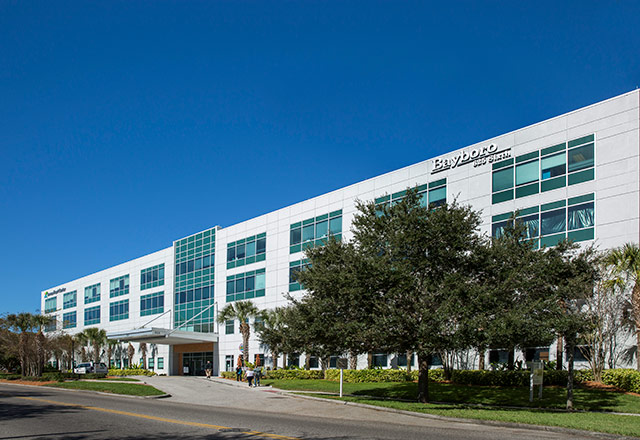
-
Children’s Orthopaedic and Scoliosis Surgery Associates
Tampa 3440 W. Dr. Martin Luther King Jr Blvd., Suite 200
Tampa, FL 33607
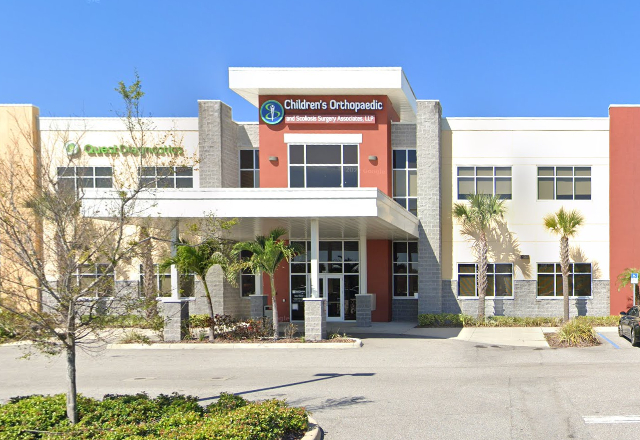
-
Johns Hopkins All Children's Outpatient Care
Sarasota 5881 Rand Blvd., Sarasota, FL 34238
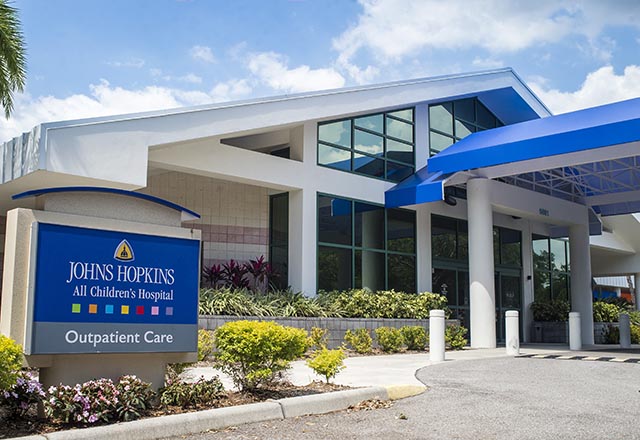
-
Johns Hopkins All Children's Outpatient Care
East Lake 3850 Tampa Road, Palm Harbor, FL 34684
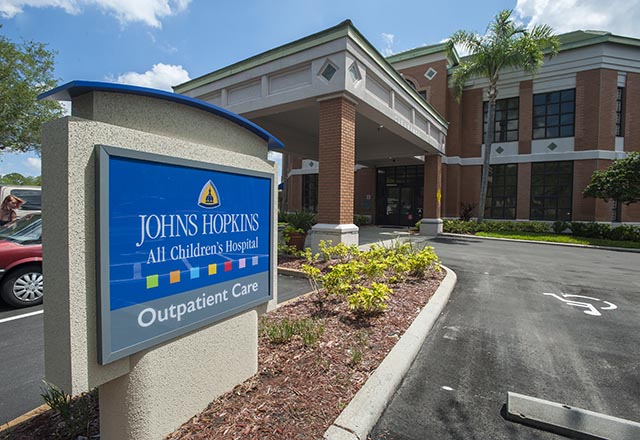
-
Johns Hopkins All Children's Outpatient Care
Pasco 4443 Rowan Road, New Port Richey, FL 34653
